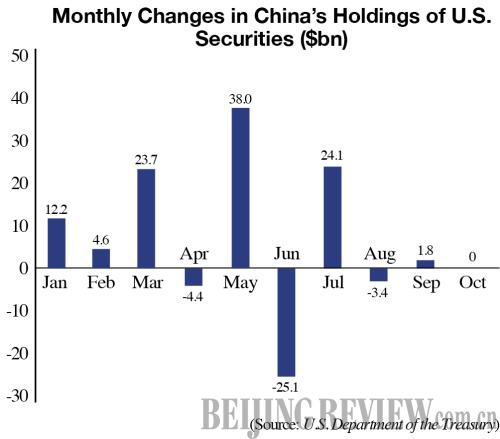| 
Numbers of the Week
31.97%
China received foreign direct investment of $7.023 billion in November, representing an increase of 31.97 percent year on year, said the Ministry of Commerce.
750 billion yuan
China's state-owned enterprises under the Central Government administration are expected to reap 750 billion yuan ($110.29 billion) in profits this year, said the State-owned Assets Supervision and Administration Commission.
TO THE POINT: Price hikes in cooking oil fuel worries over inflation and the dominance of foreign gurus over the country's grain markets. With an explosion of box office successes, leading Chinese movie studios gear up for share floats to support expansion. Exports in November showed signs of bottoming out as the sector prepares for a more prosperous year in 2010. Despite its reputation as a nation of savers, China's online consumption is burning hot as consumers enjoy the comfort of shopping from home. The aviation industry basks in the glow of the strong economic recovery as airlines transport a soaring number of passengers. Chinese companies press ahead with outbound mergers and acquisitions while overseas strategic investors remained relatively inactive in China.
By HU YUE
Cooking Oil Worries
Though China's consumer price index remains relatively low, signs are emerging that inflation may soon come roaring back.
An array of cooking oil makers, including the Shandong Luhua Group Co. Ltd. and the Shenzhen-based Arawana Co. Ltd. have recently announced increases in prices by up to 10 percent, prompting a number of consumers to cram into supermarkets and purchase barrels of the edible oil.
The collective price hikes aroused public complaints and simmering inflationary fears, as well as suspicions.
The oil makers said the price hikes were due to acute shortages of raw material supplies, an explanation that sounds reasonable but has some experts questioning the validity of the oil makers' claims.
Global soybean supplies, for instance, have increased, not decreased, by a robust 16 percent this year, said Li Guoxiang, a senior researcher with the Chinese Academy of Social Sciences. Soybean oil accounts for more than 40 percent of China's output of cooking oil.
Zhou Guanhua, an official with the State Administration of Grain, said the real cause for the price increases was a market dominated by foreign grain traders that are bumping up prices in search of windfall profits. China depends on imports to meet almost 90 percent of its soybean needs, leaving the pricing power largely in the hands of foreign grain giants.
The big four global grain gurus, namely AMD, Bunge, Cargill and Louis Dreyfus, control around 70 percent of the country's cooking oil market, with equity stakes in Chinese makers of cooking oil including Luhua and Arawana, Xinhua News Agency reported.
The heavy reliance on foreign companies puts the country in a weak position concerning soybean prices, added Zhou.
Silver Screen IPOs
As China's motion picture industry takes off, leading movie studios aim for a listing to fund their next big flicks on the silver screen.
Huayi Brothers Media Corp. (HBMC), the country's largest private moviemaker, raised almost 1.2 billion yuan ($175.6 million) from an initial public offering (IPO) on ChiNext, a NASDAQ-style growth enterprise board on the Shenzhen Stock Exchange.
Huayi's rivals are following suit. While Beijing Polybona Film Distribution Co. Ltd. is geared to float its shares on the New York Stock Exchange in the first half of 2011, China Film Group Corp. (CFG), the state-owned movie titan, is planning an IPO in Shanghai next year. Among its recent productions is the star-studded film The Founding of A Republic that set the country's box office record with 420 million yuan ($61.4 million) in the fourth quarter this year.
As big-budget blockbusters with dazzling action and fancy casts continue to dominate Chinese box offices, analysts believe financial strength may in part dictate how a moviemaker fares in a rapidly growing market. Though small compared with the United States, China's movie industry is booming. Domestic box office totals soared to 4.3 billion yuan ($629.1 million) in 2008 from a meager 920 million yuan ($134.6 million) in 2003. Movie screens totaled nearly 4,100 last year, an increase of 16.2 percent year on year.
Both Huayi and Polybona have made it clear that they will use the raised capital to expand their movie businesses and diversify into cinema operations that bring more stable revenues.
| 